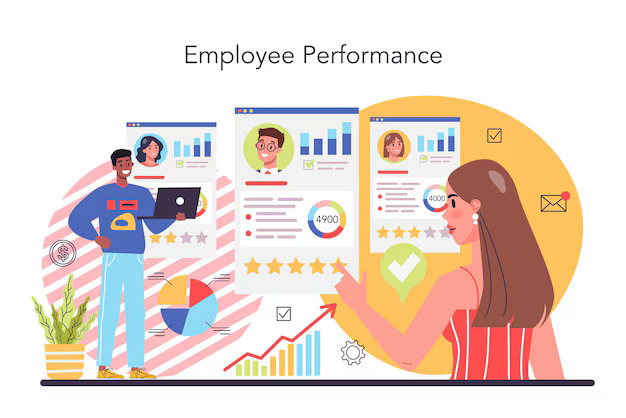Employee performance refers to how effectively an individual fulfills their job duties and responsibilities. This includes the quality of work they produce, meeting deadlines, and working efficiently. But it’s not all about individual tasks. Collaboration, communication, and a professional attitude are all crucial aspects of employee performance as well.
What is Employee performance measure
Employee performance measurement isn’t about a single metric. It’s a toolbox filled with instruments to assess various aspects of how an employee fulfills their role. There are quantitative measures like output volume and accuracy, along with qualitative measures like teamwork and communication skills. Deadlines met, goals achieved, and customer satisfaction can all be factored in.
How to Improve Employee Performance in the Workplace?
Every employee strives to perform their best at work. Seeking performance improvement through “Best EAP Provider In India” can help enhance employee performance in the workplace.
- Set Clear Expectations: Communicate clear goals, objectives, and performance expectations.
- Provide Proper Training: Ensure employees have the necessary skills and knowledge to perform their roles effectively.
- Offer Regular Feedback: Provide constructive feedback on performance and areas for improvement.
- Recognize and Reward: Acknowledge and reward outstanding performance to motivate and incentivize employees.
- Encourage Open Communication: Foster a culture of open communication where employees feel comfortable sharing ideas and concerns.
- Promote Work-Life Balance: Support employees in maintaining a healthy work-life balance to prevent burnout and enhance productivity.
- Provide Resources and Tools: Equip employees with the right resources, tools, and technologies to streamline tasks and workflows.
- Encourage Collaboration: Promote teamwork and collaboration among employees to enhance creativity and problem-solving.
- Offer Growth Opportunities: Provide opportunities for career development, training programs, and promotions based on performance.
- Set Realistic Goals: Ensure goals are achievable and aligned with employees’ skills and capabilities.
- Implement Performance Incentives: Introduce performance-based incentives such as bonuses or promotions for exceeding targets.
- Address Underperformance Promptly: Provide support and coaching to employees who are struggling to meet performance expectations.
- Promote Employee Well-being: Prioritize employee well-being through initiatives like wellness programs and stress management resources.
- Lead by Example: Demonstrate strong leadership and commitment to excellence to inspire and motivate employees.
- Encourage Continuous Improvement: Foster a culture of continuous learning and improvement to adapt to changing demands and trends.
- Seek Employee Input: Involve employees in decision-making processes and solicit their input on improving workplace performance.
Organizations can enhance employee performance, boost morale, and drive overall success in the workplace. However, neglecting “Workplace counselling” may lead to improperness in work quality and employee well-being.
What is the link between mental health and Employee performance?
The link between mental health and employee performance is significant and multi-faceted. Here are highlighting this connection:
- Productivity: Good mental health positively impacts productivity by enhancing focus, attention, and efficiency.
- Stress Management: Employees with good mental health are better able to manage stress and pressure effectively.
- Decision-Making: Mental well-being influences decision-making abilities, leading to more informed and strategic choices.
- Creativity and Innovation: Positive mental health fosters creativity and innovation, driving new ideas and solutions.
- Resilience: Good mental health promotes resilience, enabling employees to bounce back from setbacks and challenges.
- Interpersonal Relationships: Positive mental health enhances interpersonal relationships and collaboration among team members.
- Conflict Resolution: Employees with good mental health are better equipped to handle conflicts constructively and find resolutions.
- Job Satisfaction: Mental well-being contributes to job satisfaction and overall morale in the workplace.
- Absenteeism: Poor mental health can lead to increased absenteeism due to stress-related illnesses and burnout.
- Presenteeism: Employees with mental health issues may be present at work but less productive due to reduced focus and motivation.
- Quality of Work: Mental health influences the quality and accuracy of work produced by employees.
- Customer Satisfaction: Positive mental health among employees contributes to better customer service and satisfaction.
- Innovation and Adaptability: Good mental health fosters a culture of innovation and adaptability to changing circumstances.
- Leadership Effectiveness: Mental well-being enhances leadership effectiveness, enabling leaders to inspire and motivate their teams.
- Organizational Culture: Mental health impacts the overall organizational culture, influencing employee engagement and retention.
- Employee Engagement: Employees with good mental health are more engaged and committed to their roles and responsibilities.
Conclusion
Overall, promoting positive mental health in the workplace is essential for optimizing employee performance, fostering a healthy organizational culture, and achieving long-term success. Employers should prioritize mental health initiatives and provide support to ensure the well-being of their workforce.




